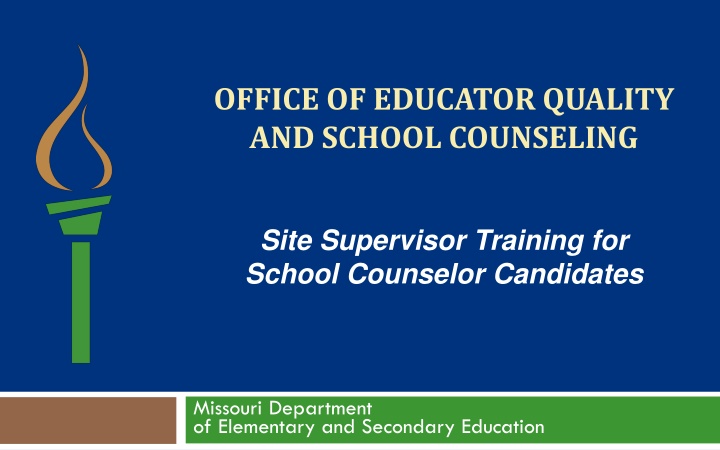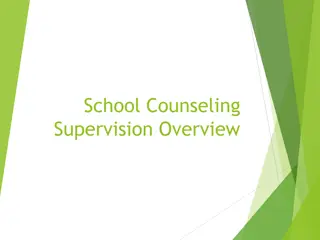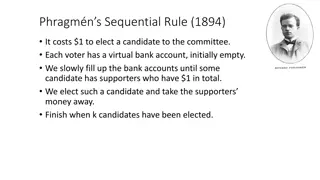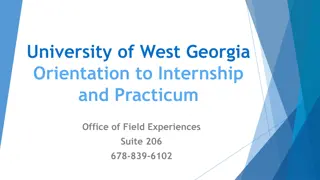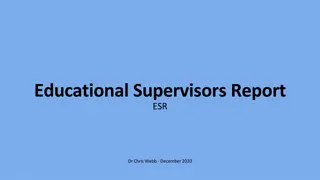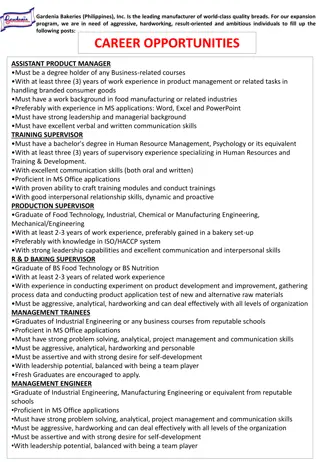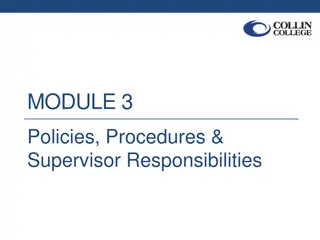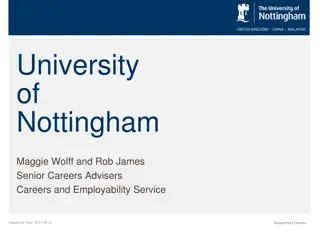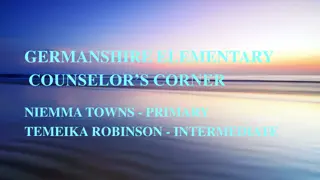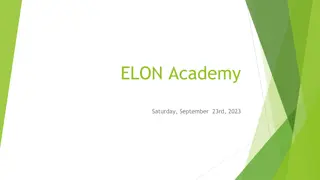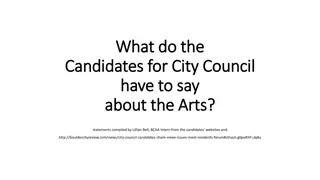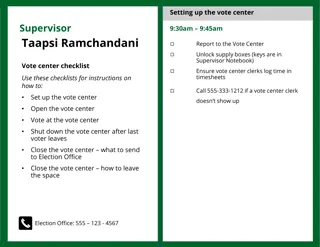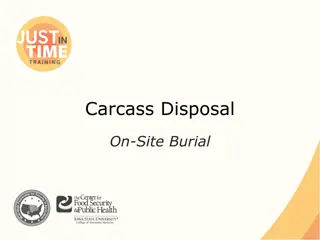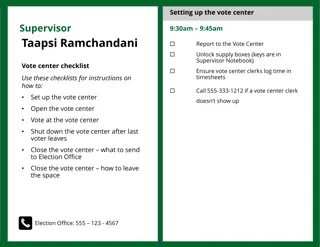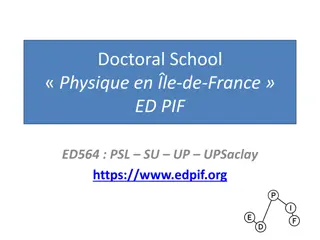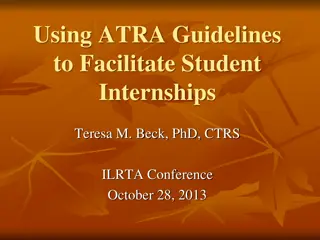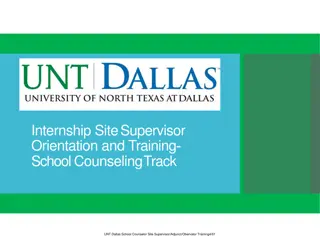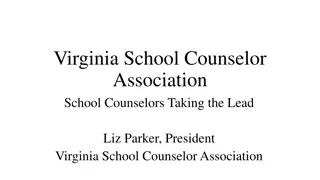Site Supervisor Training for School Counselor Candidates
This training focuses on implementing a comprehensive school counseling program, providing feedback to develop candidates effectively, and understanding statewide consistency in counselor growth. Topics covered include program implementation, professional relationships, leadership, ethical standards, and student development according to Missouri School Counselor Standards and Quality Indicators.
Download Presentation

Please find below an Image/Link to download the presentation.
The content on the website is provided AS IS for your information and personal use only. It may not be sold, licensed, or shared on other websites without obtaining consent from the author.If you encounter any issues during the download, it is possible that the publisher has removed the file from their server.
You are allowed to download the files provided on this website for personal or commercial use, subject to the condition that they are used lawfully. All files are the property of their respective owners.
The content on the website is provided AS IS for your information and personal use only. It may not be sold, licensed, or shared on other websites without obtaining consent from the author.
E N D
Presentation Transcript
OFFICE OF EDUCATOR QUALITY AND SCHOOL COUNSELING Site Supervisor Training for School Counselor Candidates Missouri Department of Elementary and Secondary Education
Learning Outcomes 2 Understand the importance and need for statewide consistency in how we grow and develop school counselor candidates. Understand the importance of meaningful and descriptive feedback in the development of school counselor candidates Understand and effectively use the School Counselor Candidate Evaluation Growth Guide
A Site Supervisor 3 Successfully implements a comprehensive school counseling program Addresses academic, social/emotional, and career development of all students Utilizes tools such as the IIR and Time Task Analysis to advocate for the program
A Site Supervisor 4 Introducing school counseling candidate to your school staff Helping your candidate get familiar with school procedures/policies/culture and climate Offering sound advice about good practice Giving guidance on what works, what doesn t and why Sharing deep knowledge about students and the school Modeling professionalism
Essential Skills 5 School Counselor Candidates apply what they have learned
Missouri School Counselor Standards and Quality Indicators (10 Indicators for Intern experience) Standard 2: Program Implementation Standard 3: Professional Relationships Standard 4: Leadership and Advocacy Standard 5: Ethical and Professional Conduct Standard 1: Student Development 3:1 Interpersonal Skills 4:1 Personal Well-Being 5:1 Ethical Standards 2:1 Structural Components 1:1 Human Growth and Development 1:2 Counseling Theories and Interventions 4:2 Leadership and Professionalism 5:2 Professional Standards 2:2 Program Components 3:2 Collaboration 1:3 Helping Relationships 3:3 Consultation Theories and Strategies 4:3 Student Advocacy 5:3 District and School Policies 2:3 Technology 1:4 Social and Cultural Diversity 3:4 School and Community Involvement 2:4 Program, Personnel, Results Evaluation 4:4 Program Leadership 5:4 Legal Requirements 1:5 Appraisal of Student Growth and Achievement 1:6 Career Development and Planning 4:5 School Culture and Climate
7 A School Counselor Candidate
Promotes mental health and well-being of students Standard 1 8 Possible Data Sources for Standard 1 Designs needs based activities across program components Student portfolios Opportunities for students to use problem solving and critical thinking Builds positive relationships with others Verification of student mastery Student feedback and reflection Builds student understanding of self/others utilizing a variety of global perspectives
Collaborates to enhance the comprehensive school counseling program Standard 2 9 Possible Data Sources for Standard 2 Written school counseling program plan Agenda/meeting notes from program advisory committee Implements collaborative practices in program planning Collaborative implementation and analysis of IIR Strategies to strengthen and sustain positive relationships with key stakeholders Facilitate partnerships between classes, grades, or whole school and local businesses and community organizations Student, parent/family, staff and community survey data
Develops relationships that support mission and improvement of the school plan Standard 3 10 Possible Data Sources for Standard 3 Maintains individual student records and assessment data Demonstrates knowledge of student backgrounds/demographics/academic growth/learning profiles Engages in community activities Models and/or shares with colleagues Maintains a calendar of activities Maintains a list of school community resources Observation of counselor interactions
Standard 4 Demonstrates leadership, vision, and advocacy for everyone in the district 11 Possible Data Sources for Standard 4 Has an ongoing agenda for professional development Plans classroom lessons that support positive school culture and climate Uses the IIR in identifying programmatic strengths and weaknesses Learns about the culture of the community and joins appropriate committees Participates in leadership responsibilities of professional organizations Engages in professional development on school climate Ties Program goals to school/district improvement goals
Adheres to current ethical and legal requirements Standard 5 12 Possible Data Sources for Standard 5 Ethical standards are articulated in written Comprehensive School Counseling Plan Logs document consultations regarding ethical/policy/legal dilemmas Agendas reflect discussion of ethical responsibilities Copies of policy revisions Classroom/small group guidelines are posted Referral policies and processes are adopted Membership in professional organizations
The What and How? 13 Understanding the Protocol and Forms
Your role as a site supervisor 14 Provide an independent rating of the 10 Quality Indicators for the School Counselor Candidate Provide meaningful and descriptive feedback for the candidate Cooperate with College or University Supervisor Complete provided formative and summative observation forms on the candidate
School Counselor Candidate Evaluation Growth Guide 15
School Counselor Candidate Evaluation Growth Guide 16
School Counselor Candidate Evaluation Growth Guide 17 A standard of performance for a defined population A rating guide for the 10 Quality Indicators to be evaluated Look at possible observable data
School Counselor Candidate Evaluation Growth Guide 18 Emphasis on the transition from knowing to doing From School Counselor Candidate to Emerging School Counselor
School Counselor Candidate Evaluation Growth Guide 19 O- Baseline: the School Counselor Candidate did not demonstrate or possess the knowledge. 1 Baseline: The School Counselor Candidate possesses the necessary knowledge but cannot apply or demonstrate the performance.
School Counselor Candidate Evaluation Growth Guide 20 2 - Emerging: The School Counselor possesses the necessary knowledge and inconsistently or somewhat effectively demonstrates performance at the Emerging Level. 3 Emerging: The School Counselor Candidate possesses the necessary knowledge and consistently and effectively demonstrates performance at the Emerging Level.
School Counselor Candidate Evaluation Growth Guide 21 4 Developing: The School Counselor Candidate demonstrates consistently at the Emerging level and is beginning to demonstrate at the developing level.
School Counselor Candidate Formative Assessment 24 School Counselor Candidate receives feedback throughout the field experience from the Site Supervisor and College or University Supervisor Each of the 10 Quality Indicators must be assessed at some point during the field experience. There is a place to note the numerical rating.
Standard 1 Feedback Example 25 Student A builds so many positive relationships with students. For example, she greets students in the hallway, inquires about their feelings if they look upset, and makes sure that they are happy before returning to class. She is in charge of a couple girls groups that focus on self esteem and friendship. She has spent her own money to purchase materials to help the girls create cool down fidgets when they become overwhelmed. She is a non- threatening staff member who is open to all students, and students seek her out.
School Counselor Candidate Summative Assessment 27 This form is used by the Site Supervisor at the culmination of the field experience. All 10 Quality Indicators should be evaluated.
The KEY to Growth and Development 28 Feedback is the breakfast of champions ~ Ken Blanchard
Feedback 29 The most powerful single modification that enhances achievement is feedback. The simplest prescription for improving education must be dollops of feedback. (Hattie and Timperly 2007)
General Example 30 School Counselor Performance Student Response/Source of Evidence Reflective Questioning Identify one behavior aligned to this Quality Indicator that will be a focus of your feedback for the School Counseling Candidate. Connect the School Counselor s behavior to a specific student response or source of evidence that you observed Generate 1-2 reflective questions for the School Counselor Candidate to consider.
1.4 Social and Cultural Diversity Example 31 School Counselor Performance Student Response/Source of Evidence Reflective Questioning 1) What are some strategies you utilized in this discussion that were beneficial? I noticed how you facilitated the small group revolving around a culturally sensitive issue. The students responded positively when given the chance to explain each of their own unique perspectives. 2) How did you feel the students responded? Are there any ways you would like to improve student response or engagement? The students were able to acknowledge a different perspective.
2.4 School Counseling Program, Personnel, Results Evaluation Example 32 School Counselor Performance Student Response/Source of Evidence Reflective Questioning 1) What did you learn from the results? I noticed that you collected pre and post perceptual data on the counseling activity you facilitated. By collecting this data, you were able to identify student growth. 2) How can you utilize the results to improve future practices?
3.2 Collaboration Example 33 School Counselor Performance Student Response/Source of Evidence Reflective Questioning 1) What was your thinking in providing those particular strategies or resources? I noticed you contributed to the team meeting last week regarding a student. The intervention you suggested was implemented by the teacher and led to student success. 2) What has been your experience with this student which helped you identify this might be a successful intervention?
4.5 School Climate and Culture Example 34 School Counselor Performance Student Response/Source of Evidence Reflective Questioning 1) What are some other strategies you might use to promote safety, mutual respect, and a positive school culture and climate? I noticed you were standing in hallways during passing periods. This resulted in several students stopping to talk to you. 2) How did you feel this contributed to the positive school culture and climate?
5.4 Legal Requirements Example 35 School Counselor Performance Student Response/Source of Evidence Reflective Questioning 1) What other professional development opportunities can you seek to better acquaint yourself with legal responsibilities? I noticed in our professional learning session you had some questions about mandated reporting. Your response indicated you were trying to understand the laws and your obligations in mandated reporting to help keep students safe. 2) Explain how school policies or state statutes impact your practice as a school counselor.
Congratulations! 36 You have completed the School Counseling Site Supervising Training. Please use this link and email a signed copy to your university supervisor to keep on file! https://dese.mo.gov/sites/default/files/cnsl-site- supervisor-form.pdf
Questions? 37 Please contact your College or University Supervisor or Educator Preparation in the office of Educator Quality at DESE 573-751-1668 The Department of Elementary and Secondary Education does not discriminate on the basis of race, color, religion, gender, national origin, age, or disability in its programs and activities. Inquiries related to Department programs and to the location of services, activities, and facilities that are accessible by persons with disabilities may be directed to the Jefferson State Office Building, Office of the General Counsel, Coordinator Civil Rights Compliance (Title VI/Title IX/504/ADA/Age Act), 6th Floor, 205 Jefferson Street, P.O. Box 480, Jefferson City, MO 65102-0480; telephone number 573-526-4757 or TTY 800-735- 2966; email civilrights@dese.mo.gov.
